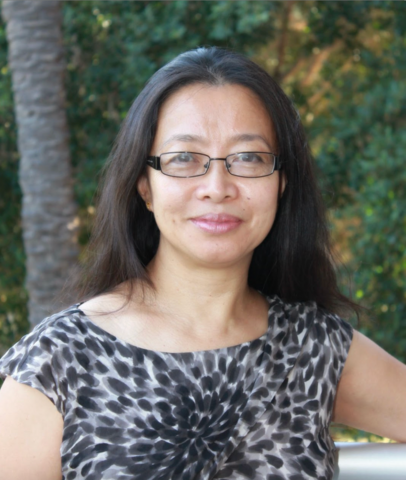
Outstanding Faculty Mentors

Nalini Chhetri
Outstanding Instructional Faculty Mentor
Clinical Professor, School for the Future of Innovation in Society, College of Global Futures
Bio:
I am a faculty in the School for the Future of Innovation in Society and School of Sustainability in the College of Global Futures. I have been with ASU since 2005 and have served in other Schools here as well. I have had degrees and mentors from the USA and Asia, but my first mentor was my mother who was an elementary school teacher who taught in impoverished schools in the Himalayan region. She, and my father, away in the army, but vested in his children, taught their four daughters and son – the priceless value of an education, and the need to be empathetic to others. I hope I do that every day in their honor. Today, it is my own family that grounds me – my husband, my daughter, and my son.
Academically, I am an interdisciplinary scholar trained in the natural and social sciences. While I consider myself primarily a teacher, I have a “doer’s” proclivity - having worked for non-profit organizations on sustainable development, women empowerment, and environmental issues. It is these life experiences that I bring to my classroom, to my research and to my mentoring of my students.
Mentoring Statement:
My mentoring philosophy has evolved through my own life experiences and scholarly pursuits. I focus on building robust relationship with my mentees, ensuring thoughtful interactions and feedback, connecting them with people and opportunities, and providing support in any way I can, and, above all, ensuring that they flourish in their own scholarly pursuits. I know that mentoring is a privilege that is not afforded to all of us. The privilege and responsibility to shape minds is something I take very seriously and with humility. I think of mentoring in three different ways– what shaped my approach to mentoring; the values and learning that undergird my mentoring approach; and the breadth and depth of my mentees’ scholarly and life experiences that, also, shape my own approach.
First, mentoring has been part of my formative experience. It comes from a childhood spent in an intergenerational and extended family where I was the oldest sibling in charge of younger siblings and cousins, and tasked with tutoring, mothering, sharing in everyday joys and griefs, and learning to tend to the bruises of the body and soul of family members.
Having a mother who was a dedicated elementary school teacher who taught in impoverished schools in the Himalayas helped as did the experience of being a mother myself, and a member of the community I live in Arizona. Finally, as an interdisciplinary scholar focusing on vulnerable populations in domains of sustainable development, STEM education, energy and climate change - all of these milestones in my life have shaped how I approach mentoring.
Second, I have found that mentoring is individually based and unique to every person I work with. While there are broad commonalities, every mentee and their needs are unique. I have learnt that good mentoring cannot be a one-time interaction. It takes time to build an effective mentoring relationship. This means that I meet with my mentee frequently, especially in the initial phases. Often, I have found myself gravitating towards those who have struggled more in their academic journey, and I have proactively approached them to o>er guidance. Once I sit down with my mentees – our conversations are built around questions and prompts, listening, getting to the root of issues, and discussing both scholarly and life experiences-something most mentors, also, experience. Lending an ear is an effective strategy. Above all, I know that mentees value good feedback and accountability which I try to provide with regular interactions and achievable workplans.
Finally, my experience mentoring at ASU and abroad – at undergraduate, masters, and doctoral levels – have allowed me to learn from a rich and wide-ranging areas of disciplinary scholarship. I have mentored 20+ PhD students, 15+ masters, over two dozen undergraduates including Barrett scholars, and dozens of study-abroad students from di>erent schools across the university. The different degrees and the interdisciplinary breadth of scholarship they work on, across wide ranging disciplines, have been marvelous and have ignited mutual interest in me too. I have tried to leverage these experiences to ensure my mentees become better scholars and citizens themselves. Their work has ranged from climate impacts in rice farming, to energy solutions for marginalized communities; from urban sustainability to improved economic index to measure poverty, and include work on how to assimilate incarcerated population in society in U.S. My mentees are from around the globe and the U.S., and they have educated me through their own scholarship, intelligence, and cultural values of their own life experiences that they bring to the table.